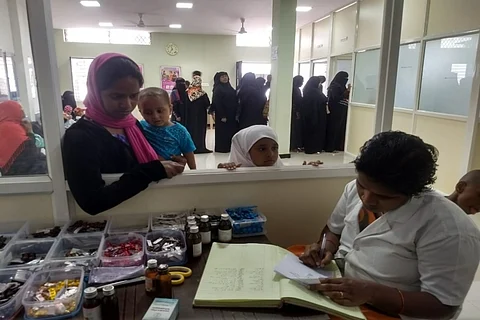

Several women in small groups carrying babies and children throng the Basthi Dawakhana in Hashimabad, old city, Hyderabad. Within a few minutes, serpentine queues are formed outside the doctor’s chamber and the nurses and staff intently write down names of patients and hand out medicines that are prescribed by the doctor. This is a regular scene at the hospital, says clinic nurse Kavitha.
“The hospital gets crowded like this every day, we don’t get any relief until 1.30 pm,” laughs Kavitha, as she continues giving out medicines to the patients.
Inaugurated on April 6, Basthi Dawakhana or Basthi Clinic is the Telangana government’s novel initiative aiming to provide healthcare to everyone in urban areas. This initiative was inspired by the Delhi government’s Mohalla Clinic, with the exception that the services are free of cost.
This initiative is a joint collaboration by the city’s municipal administration — Greater Hyderabad Municipal Corporation (GHMC) and the Central government – which has allocated Rs 1,200 crore for Health and Wellness Centres under the Ayushman Bharat programme.
The intent of the project was to establish a health centre at areas which lack Urban Primary Health Centres (UPHC) and also to reduce the burden on tertiary hospitals like Osmania General Hospital, Niloufer and Gandhi Hospital, including UPHCs.
50-year-old Rabiya Begum, resident of Hashimabad, a frequent visitor to the clinic says, “I suffer from thyroid and sugar. I have come here to get the tests done and get medicines.”
According to Rabiya, she would visit private clinics every 2-3 months for tests and medicines which would cost her Rs 200 - Rs 300. “Now I don’t spend any money and the medicines they prescribe are also quite effective,” she affirms.
A total of 17 such clinics have been opened across the city in areas which have large number of slum-dwellers. Though, the intent of the project is to make healthcare accessible to the poor and underprivileged, this benefit is availed by everyone alike.
“We don’t have a policy claiming that it is meant for only certain sections of society who can’t afford private hospitals. Everyone is availing these benefits,” says BG Prakash, Basthi Dawakhana, project officer.
These clinics, besides giving medicines for cold, cough and other ailments, are also entrusted with other responsibilities like antenatal checkup and also for vaccinating children in the neighbourhood.
To ensure the health of the foetus and the mother, these clinics work in coordination with ASHA (Accredited Social Health Activist) workers.
The clinics open at 9 am and are open till 4 pm, except on Sundays. While Wednesdays are dedicated for immunization of children in the area, Thursdays are dedicated for antenatal checkup and postnatal checkup.
Though the operations officially began in April, the project took off in November 2017. The GHMC had to map each area, where they identified nearly 1,400 slums in the city. The GHMC, during its discussions, finalized that the criteria to establish Basthi Dawakhana was that within a radius of 3-5 km there should be no UPHC and the slum population should be between 5,000-10,000.
The Dawakhanas have opened presently in Yellamma Banda, Indira Gandhi Puram, Chacha Nehru Nagar, Bakaram, Arundathi Nagar, BJR Nagar, Errakunta, CN Colony near Uppal, Ranganayakula Gutta, Phool Bagh, Godibowli, Ganga Nagar, Prashasan Nagar, Shyamlal building and Gaddiannaram.
Authorities assure that they would establish 158 more such Dawakhanas by December 2018.
Success of Basthi Dawakhana
Across the 17 clinics, the officials during their study anticipated that the project will be a success, if they get at least 40 patients in each clinic, thereby reducing burden on other government hospitals.
“Basthi Dawakhana is a huge hit. On an average we are getting 57 patients, which is more than what we anticipated,” says project officer, Prakash.
He says that among the 17 clinics, Hashimabad near Falaknuma, Nandanavanam near Meerpet, Godibowli near Malakpet witness 131 patients on an average. “We allocate Rs 15,000 to each clinic for medicines, but in these three hospitals, we have extended the budget to Rs 23,000 due to an overwhelming patient influx. Isn’t this a sign of success?” Prakash asks.
“Technically I have saved close to Rs 500, this monsoon. During this season, my kids fall ill one after the other. We have to take each one of them to private clinic. However, now I bring all my children here and get medicines for cold and cough for free,” says Mehboob, mother of four.
Another patient, Marina adds, “The medicines they prescribe are quite good and reliable unlike private clinics. To collect medicines for joint pains, I visit the clinic regularly. These clinics are really a blessing for us.”
The overwhelming response also has its demerits, as the medicines run out within a couple of days and the patients are asked to visit after 2 or 3 days.
Referral system in Basthi Dawakhana
Basthi Dawakhanas don’t admit any patients, they just checkup patients for minor ailments and send them away after giving medicines. If the ailment is serious, they refer them to UPHCs.
Initially, these clinics were conducting 19 types of tests like testing blood sugar, blood pressure, anaemia etc. However, since June 18, they have extended it to 56 diagnostics tests which includes tests for thyroid, malaria, tuberculosis.
Each clinic which has a doctor, nurse and a support staff, is also equipped with a computer with internet facility. The clinic takes blood samples from the patients, which would be collected by staff from the UPHCs. On pilot basis, clinics in BJR Nagar, Hashimabad, Nandanavanam and Godibowli have ‘clusters.’ These clusters (UPHCs) collect these samples and send the report within two days via internet which staff at the clinics download and hand it over to patients.